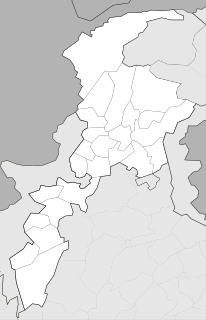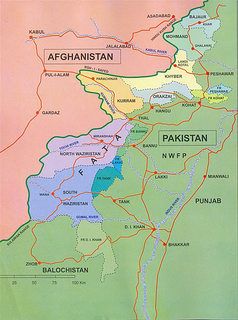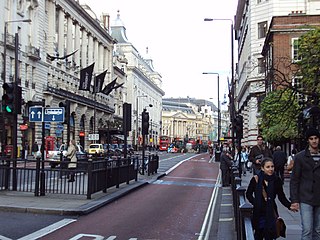
Dera Ismail Khan, often abbreviated to D.I. Khan, is a city in Khyber Pakhtunkhwa Province, Pakistan. It is situated on the west bank of the Indus River, about 300 kilometres (190 mi) south of the provincial capital Peshawar, and 230 kilometres (140 mi) northwest of Multan, Punjab. The city is the capital of the district and tehsil of the same name. The predominant language is Saraiki. The total population of the city was 217,457 in the 2017 census, making it the largest city in the southern part of Khyber Pakhtunkhwa.

Kohat, is a city in the Khyber Pakhtunkhwa province of Pakistan which serves as the capital of the Kohat District. The city is regarded as a centre of the Bangash tribe of Pashtuns, who have lived in the region since the late 15th century. Kohat's immediate environs were the site of frequent armed skirmishes between British colonialist forces and local tribesmen in the mid to late 19th century. Modern Kohat is now a medium-sized city with a population of approximately 270,000 people, and centres on a British-era fort, various bazaars, and a military cantonment.

The Awami National Party is a secular and leftist Pashtun nationalist political party in Pakistan. The party was founded by Abdul Wali Khan in 1986 and its current president is Asfandyar Wali Khan, grandson of Bacha Khan, with Mian Iftikhar Hussain serving as the Secretary-General. Part of the PPP-led cabinet of the Pakistani government during 2008−13, the ANP's political position is considered left wing, advocating for secularism, democratic socialism, public sector government, and economic egalitarianism.

The Babrra massacre was a mass shooting in which about 600 unarmed Pashtuns, who were supporters of the Khudai Khidmatgar movement, were killed and more were injured on Babrra ground in the Hashtnagar region in Charsadda District, North-West Frontier Province, Pakistan. The massacre took place on 12 August 1948, on the order of the Chief Minister of the North-West Frontier Province, Abdul Qayyum Khan Kashmiri.
Arbab Sikandar Khan Khalil (1913–1982) was a governor of the Khyber-Pakhtunkhwa province of Pakistan. He was of the National Awami Party, which won the 1970 elections in Khyber-Pakhtunkhwa and Balochistan and later formed the provincial governments. He was dismissed as Governor by the Federal government in 1973 and subsequently arrested as part of the Hyderabad tribunal. He was released in 1979 and was assassinated in 1981.

The History of Khyber Pakhtunkhwa concerns the history of the North Western region of what is now the state of Pakistan, as well as the surrounding areas that have been colloquially referred to as Pashtunistan. The earliest evidence from the region indicates that trade was common via the Khyber Pass; originating from the Indus Valley Civilization. The early people of the region were a Vedic people known as the Pakthas, identified with the modern day Pakhtun peoples. The Vedic culture reached its peak between the 6th and 1st centuries B.C under the Gandharan Civilization, and was identified as a center of Hindu learning and scholarship.

The 19 April 2010 Peshawar bombing was a suicide bombing that occurred in a marketplace in Peshawar, Pakistan. At least 25 people died and around 27 individuals were injured. The explosion was the second to have occurred in the city that day, the first of which killed several children near a city school.
In 2009, Pakistan suffered 50 terrorist, insurgent and sectarian-related incidents that killed 180 people and injured 300.

The 2012 Khyber Agency bombing occurred on 10 January 2012, when a bomb exploded near a petrol pump in the town of Jamrud near the Afghan border in Khyber Agency of the Federally Administered Tribal Areas (FATA) of Pakistan. The bombing killed at least 30 people while 78 others were injured.
This is a list of terrorist incidents in Pakistan in 2012. Pakistan has faced numerous attacks by insurgents as a result of the ongoing War in North-West Pakistan by the Pakistani military against militant groups, part of the War on Terror. At the same time, there have also been numerous drone attacks in Pakistan carried out by the United States which exclusively target members of militant groups along the Afghan border regions.
The following is a timeline of the history of the city of Peshawar, Pakistan.
Qissa Khwani Bazaar bombing took place in the Qissa Khwani Bazaar market in Peshawar, Pakistan on 29 September 2013 killing at least 41 people and another 100 were injured.

On 16 December 2014, six gunmen affiliated with the Tehrik-i-Taliban Pakistan (TTP) conducted a terrorist attack on the Army Public School in the northwestern Pakistani city of Peshawar. The militants, all of whom were foreign nationals, included one Chechen, three Arabs and two Afghans. They entered the school and opened fire on school staff and children, killing 149 people including 132 schoolchildren, ranging between eight and eighteen years of age making it the world's fourth deadliest school massacre. A rescue operation was launched by the Pakistan Army's Special Services Group (SSG) special forces, who killed all six terrorists and rescued 960 people.
This is a list of terrorist incidents in Pakistan in 2016. Pakistan was the 10th most dangerous country by criminality index in 2016.

The Qasim Ali Khan Mosque is a 17th-century mosque in Peshawar, Khyber Pakhtunkhwa, Pakistan. Located in Qissa Khwani Bazaar, Mohallah Baqir Shah. The mosque was built during Emperor Aurangzeb's reign, by Qasim Ali Khan, a news writer and administrator in the government of Kabul. The mosque is situated in the Misgaran Qissa Khwani Bazaar.
Operation Radd-ul-Fasaad is a codename of a combined military operation by the Pakistani military in support of local law enforcement agencies to disarm and eliminate the terrorist sleeper cells across all states of Pakistan, started on 22 February 2017. The operation is aimed to eliminate the threat of terrorism, and consolidating the gains of Operation Zarb-e-Azb which was launched in 2014 as a joint military offensive. It is further aimed at ensuring the security of Pakistan's borders. The operation is ongoing active participation from Pakistan Army, Pakistan Air Force, Pakistan Navy, Pakistan Police and other Warfare and Civil Armed Forces managed under the Government of Pakistan. This Operation has been mostly acknowledged after Operation Zarb e Azb.


























